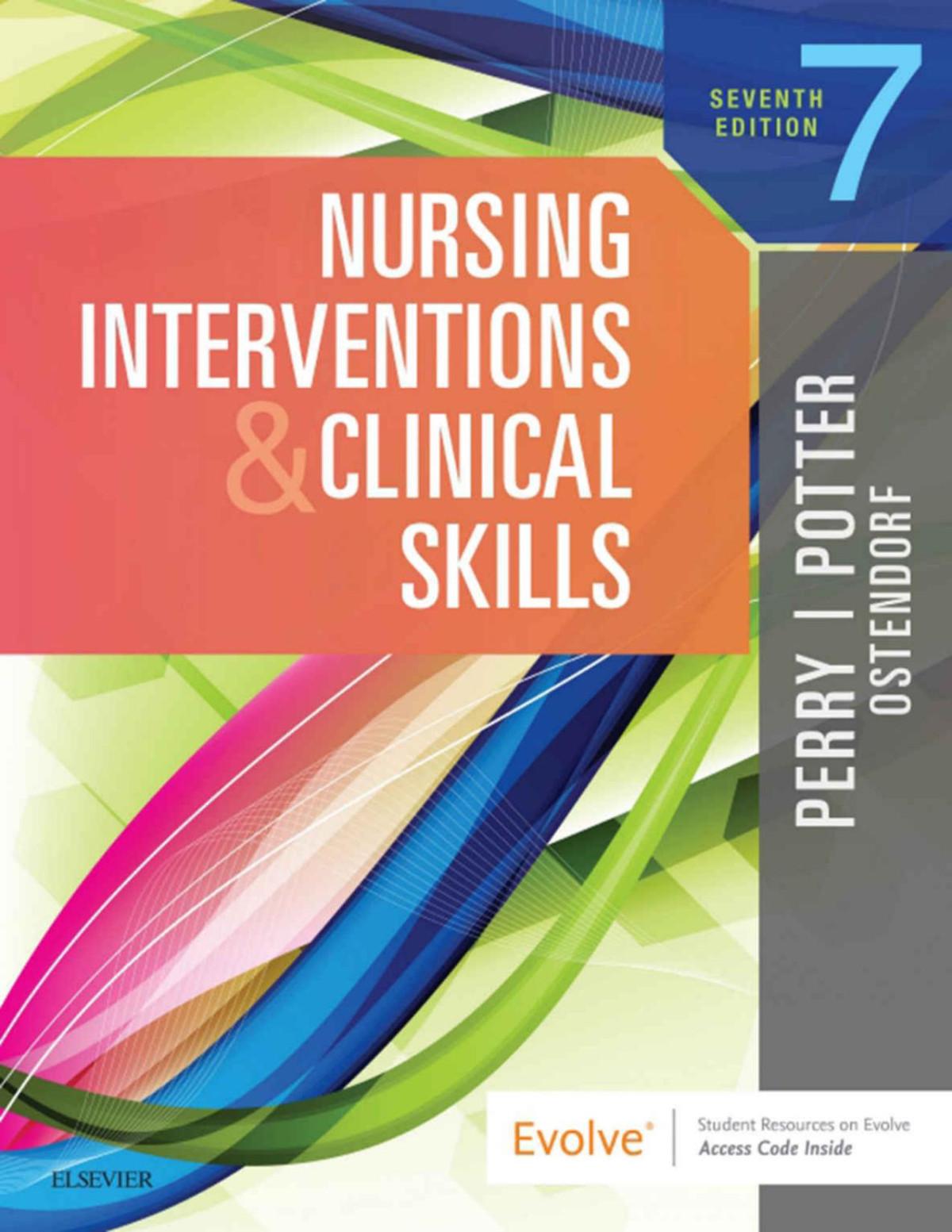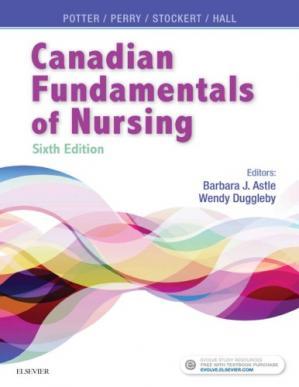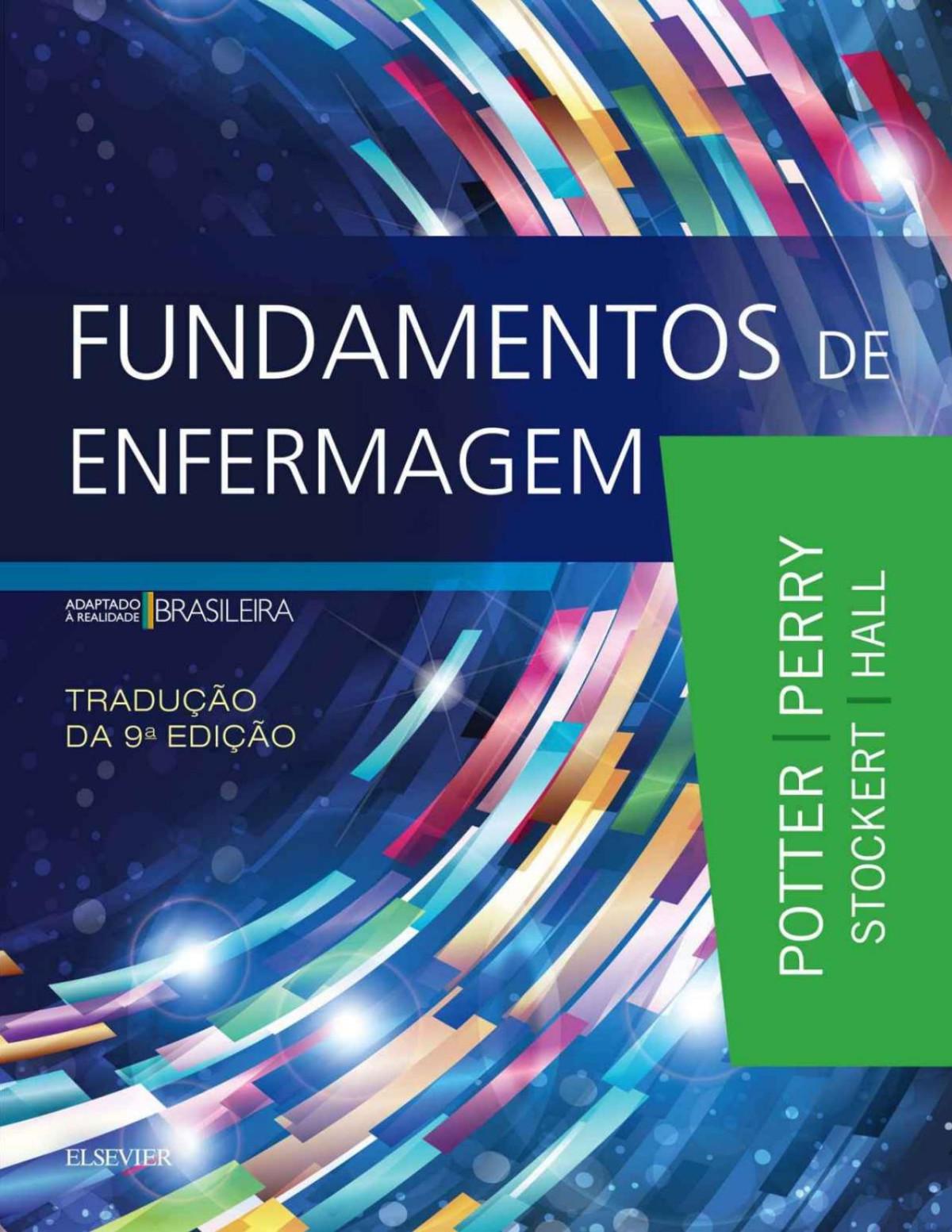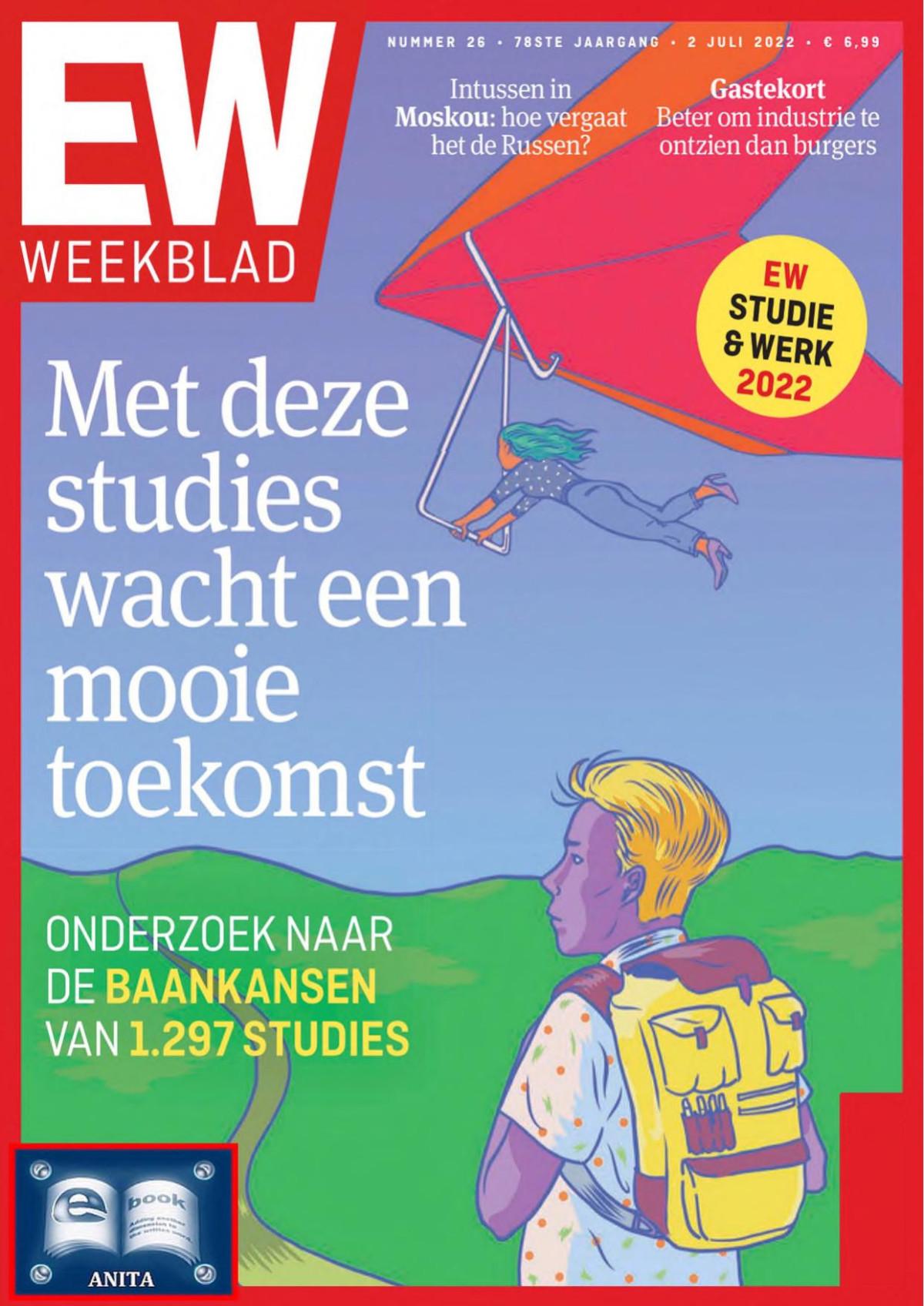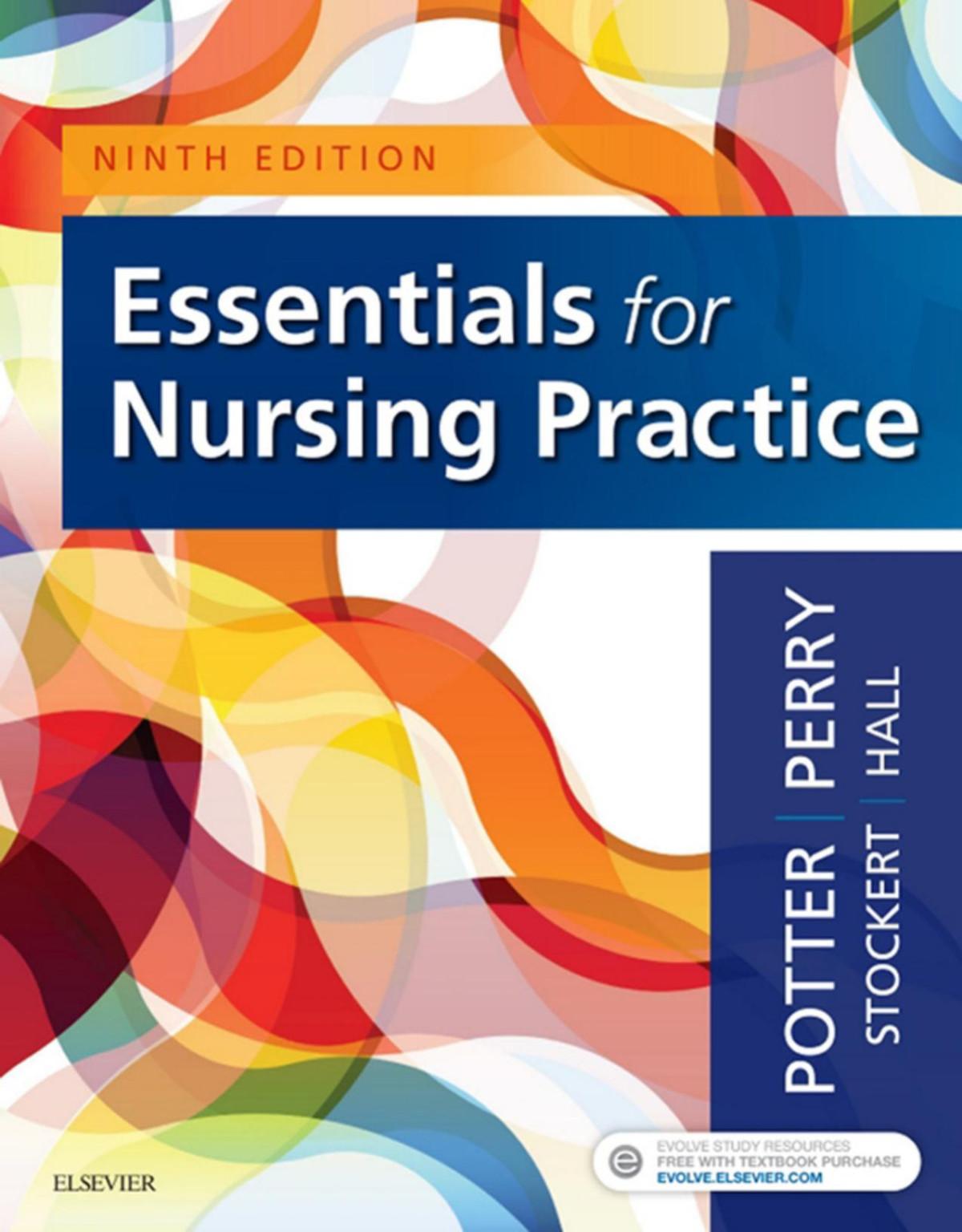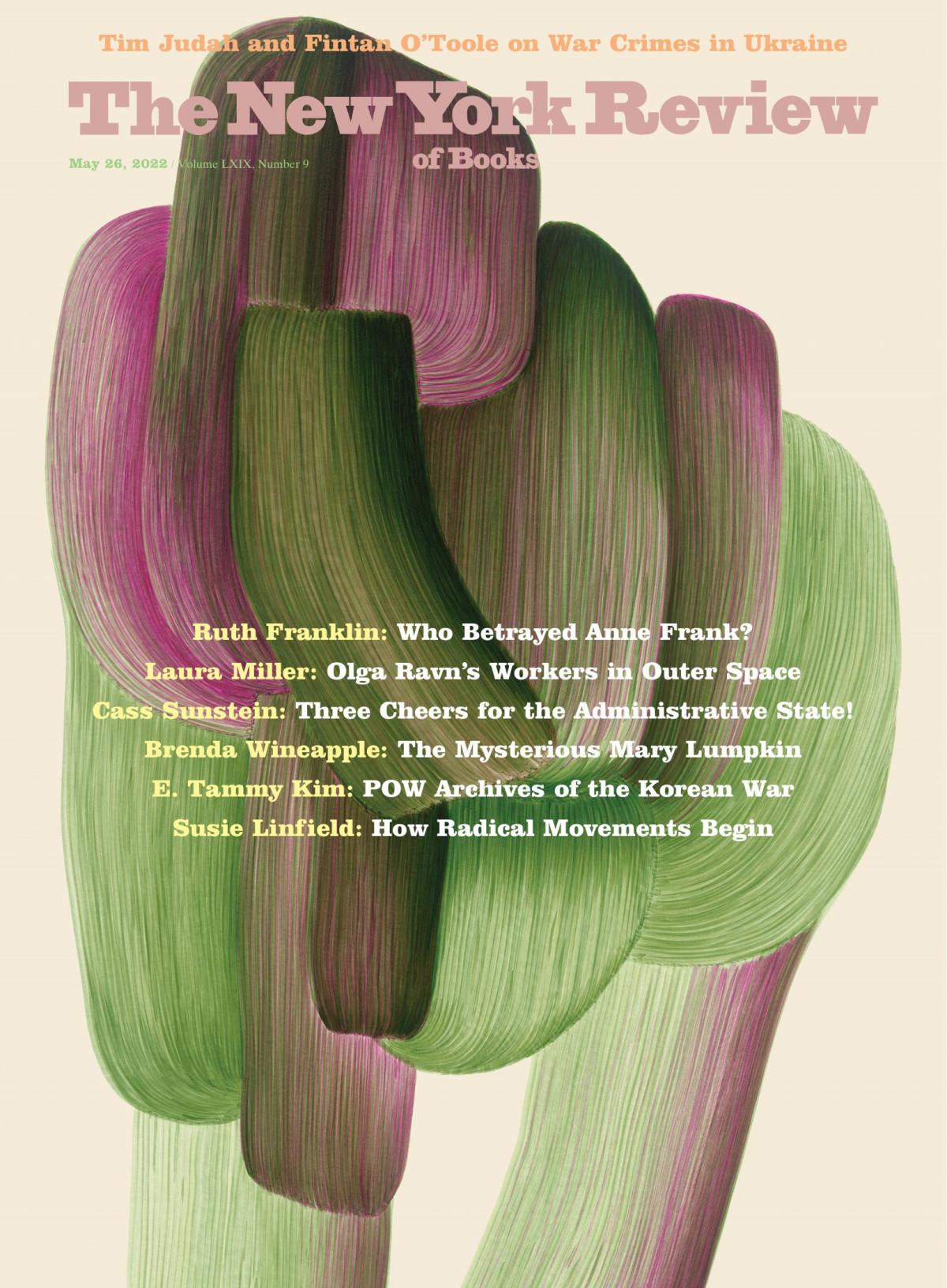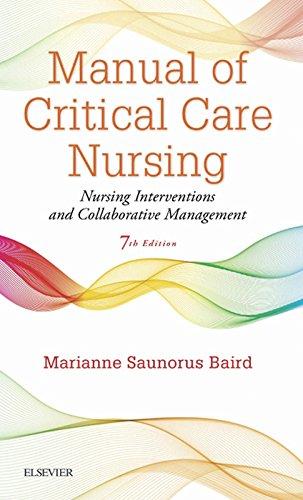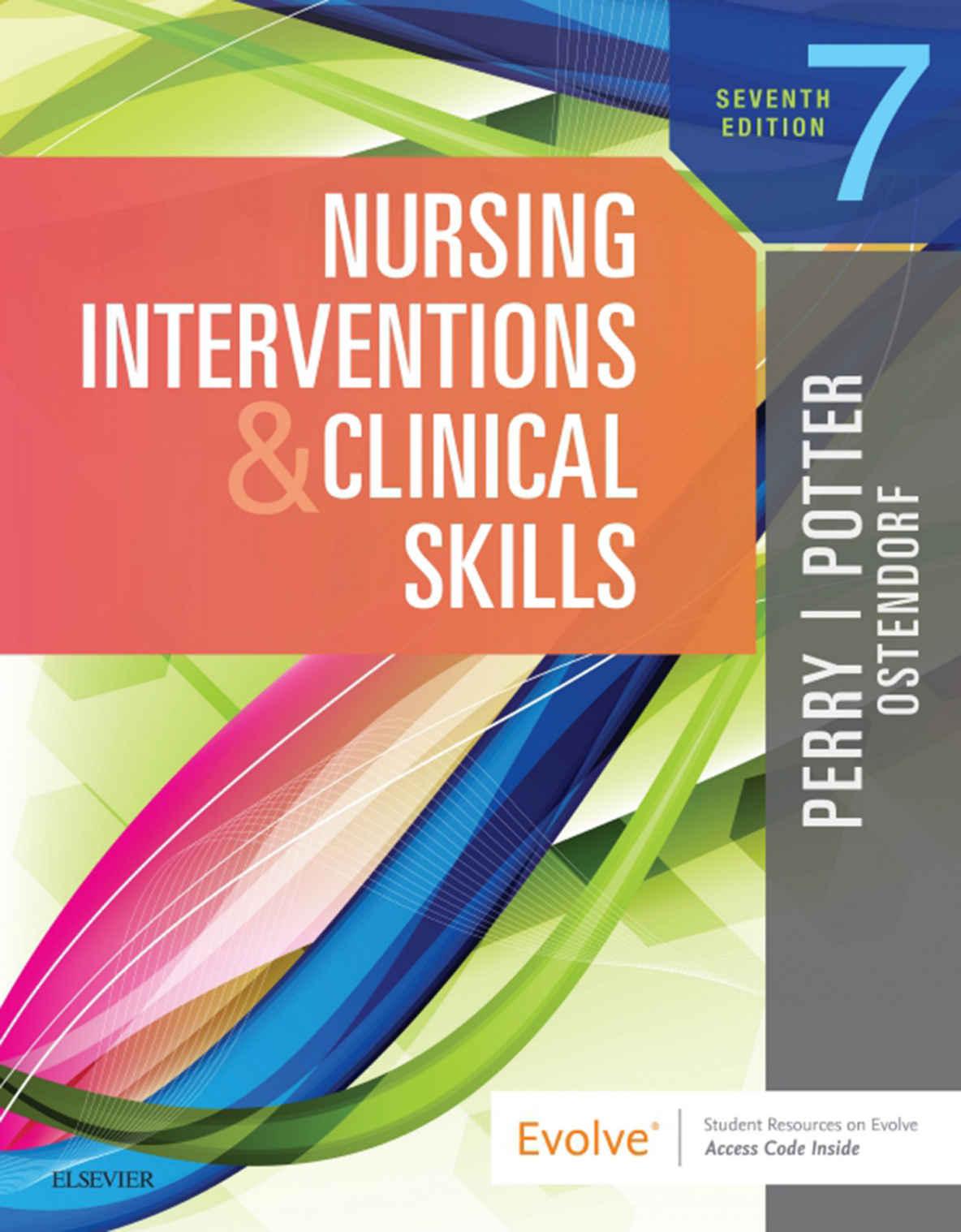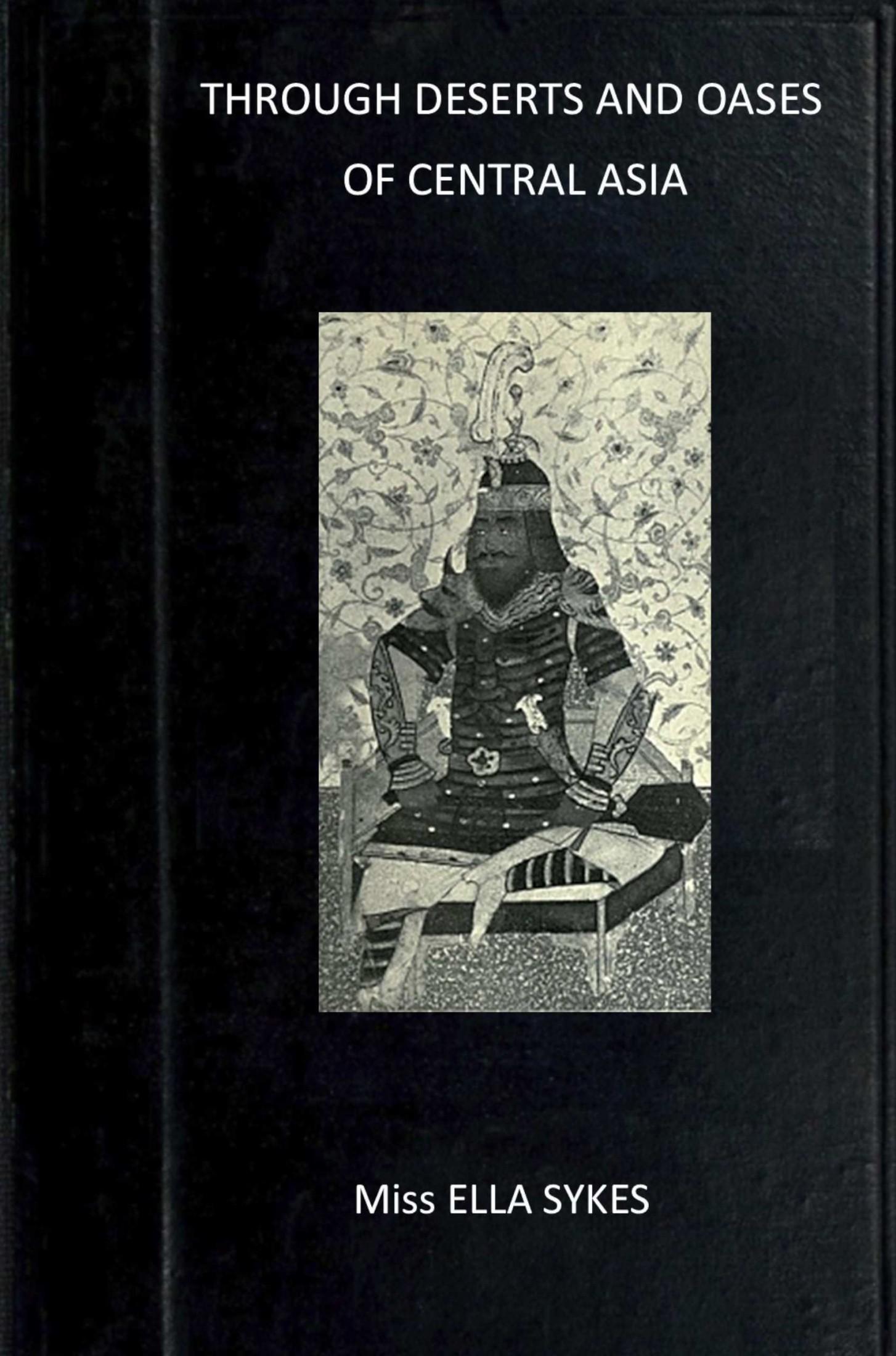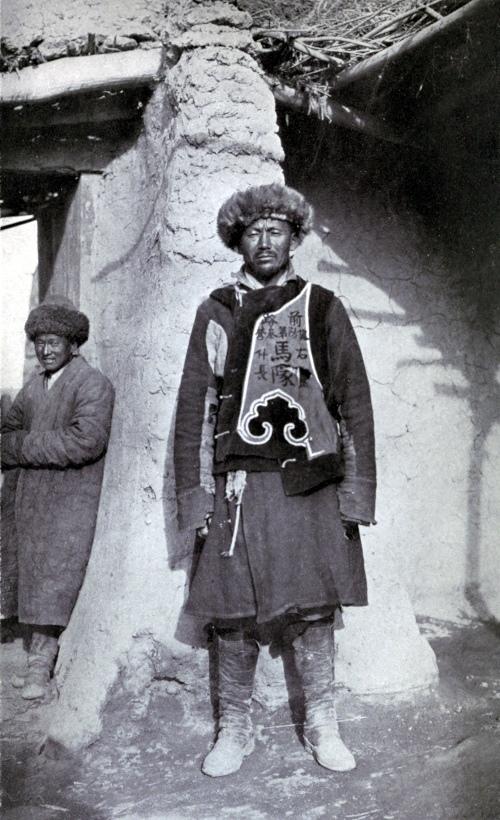Table of Contents
Cover image
Title Page
Copyright
About the Authors
Contributors
Reviewers
Acknowledgments
Notes From the Authors
Preface to the Instructor
Key Features New to This Edition
Ancillaries
Unit 1 Quality and Safety in Nursing Practice
1 Using Evidence in Nursing Practice
Introduction
Steps in the EBP Framework
Safe and Effective Nursing Skills and Procedures
Practice Standards
Practice Standards
Benefits of EBP
Practice Reflections
Clinical Review Questions
References
2 Communication and Collaboration
SKILL 2.1 Discharge Planning and Transitional Care
SKILL 2.2 Workplace Violence and Safety
Clinical Review Questions
References
3 Documentation and Informatics
Introduction
Practice Standards
Electronic Health Record
Evidence-Based Practice
Safety Guidelines
Confidentiality
Legal Guidelines in Documentation
Standards
Guidelines for Quality Documentation
Special Considerations
Practice Reflections
Clinical Review Questions
References
4 Patient Safety and Quality Improvement
SKILL 4.1 Fall Prevention in a Health Care Setting
SKILL 4.2 Designing a Restraint-Free Environment
SKILL 4.3 Applying Physical Restraints
SKILL 4.4 Seizure Precautions
Clinical Review Questions
References
5 Infection Control
SKILL 5.1 Hand Hygiene
SKILL 5.2 Applying Personal Protective Equipment
SKILL 5.3 Caring for Patients Under Isolation Precautions
SKILL 5.4 Preparing a Sterile Field
SKILL 5.5 Sterile Gloving
Clinical Review Questions
References
6 Disaster Preparedness
SKILL 6.1 Care of a Patient After Biological Exposure
SKILL 6.2 Care of a Patient After Chemical Exposure
SKILL 6.3 Care of a Patient After Radiation Exposure
Clinical Review Questions
References
Unit 2 Patient Assessment Skills
7 Vital Signs
SKILL 7.1 Measuring Body Temperature
SKILL 7.2 Assessing Apical Pulse
SKILL 7.3 Assessing Radial Pulse
SKILL 7.4 Assessing Respirations
SKILL 7.5 Assessing Blood Pressure
Clinical Review Questions
References
8 Health Assessment
SKILL 8.1 General Survey
SKILL 8.2 Assessing the Head and Neck
SKILL 8.3 Assessing the Thorax and Lungs
SKILL 8.4 Cardiovascular Assessment
SKILL 8.5 Assessing the Abdomen
SKILL 8.6 Assessing the Genitalia and Rectum
SKILL 8.7 Musculoskeletal and Neurological Assessment
Clinical Review Questions
References
9 Specimen Collection
SKILL 9.1 Urine Specimen Collection—Midstream (CleanVoided) Urine, Sterile Urinary Catheter
SKILL 9.2 Testing for Gastrointestinal Alterations Gastroccult Test, Stool Specimen, and Hemoccult Test
SKILL 9.3 Collecting Nose and Throat Specimens
SKILL 9.4 Collecting a Sputum Specimen
SKILL 9.5 Collecting Wound Drainage Specimens
SKILL 9.6 Blood Glucose Monitoring
SKILL 9.7 Collecting Blood and Culture Specimens by Venipuncture (Syringe and Vacutainer Method)
Clinical Review Questions
References
10 Diagnostic Procedures
SKILL 10.1 Intravenous Moderate Sedation
SKILL 10.2 Contrast Media Studies: Arteriogram (Angiogram), Cardiac Catheterization, Intravenous Pyelogram
SKILL 10.3 Care of Patients Undergoing Aspirations: Bone Marrow, Lumbar Puncture, Paracentesis, Thoracentesis
SKILL 10.4 Care of Patients Undergoing Bronchoscopy
SKILL 10.5 Care of Patients Undergoing Gastrointestinal Endoscopy
SKILL 10.6 Obtaining a 12-Lead Electrocardiogram
Clinical Review Questions
References
Unit 3 Basic Human Needs
11 Bathing and Personal Hygiene
SKILL 11.1 Complete or Partial Bed Bath
SKILL 11.2 Performing Mouth Care for an Unconscious or Debilitated Patient
Clinical Review Questions
References
12 Care of the Eye and Ear
SKILL 12.1 Eye Irrigation
SKILL 12.2 Ear Irrigation
Clinical Review Questions
References
13 Promoting Nutrition
SKILL 13.1 Dysphagia Screening and Assisting With Oral Nutrition
SKILL 13.2 Aspiration Precautions
SKILL 13.3 Insertion and Removal of a Small-Bore Feeding Tube
SKILL 13.4 Verifying Placement and Irrigating a Feeding Tube
SKILL 13.5 Administering Enteral Nutrition: Nasogastric, Nasointestinal, Gastrostomy, or Jejunostomy Tube
Clinical Review Questions
References
14 Parenteral Nutrition
SKILL 14.1 Administering Central Parenteral Nutrition
SKILL 14.2 Administering Peripheral Parenteral Nutrition With Lipid (Fat) Emulsion
Clinical Review Questions
References
15 Pain Management
SKILL 15.1 Pain Assessment and Basic Comfort Measures
SKILL 15.2 Nonpharmacological Pain Management
SKILL 15.3 Pharmacological Pain Management
SKILL 15.4 Patient-Controlled Analgesia
SKILL 15.5 Epidural Analgesia
SKILL 15.6 Local Anesthetic Infusion Pump for Analgesia
SKILL 15.7 Moist and Dry Heat Application
SKILL 15.8 Cold Application
Clinical Review Questions
References
16 Promoting Oxygenation
SKILL 16.1 Oxygen Administration
SKILL 16.2 Airway Management: Noninvasive Positive-Pressure Ventilation
SKILL 16.3 Airway Management: Suctioning
SKILL 16.4 Care of Artificial Airways
SKILL 16.5 Managing Closed Chest Drainage Systems
Clinical Review Questions
References
Unit 4 Activity and Mobility
17 Safe Patient Handling
SKILL 17.1 Transfer Techniques
SKILL 17.2 Moving and Positioning Patients in Bed
Clinical Review Questions
References
18 Exercise, Mobility, and Immobilization Devices
SKILL 18.1 Assisting With Ambulation (Without Assist Devices)
SKILL 18.2 Use of Canes, Crutches, and Walkers
SKILL 18.3 Care of a Patient With an Immobilization Device
Clinical Review Questions
References
Unit 5 Promoting Elimination
19 Urinary Elimination
SKILL 19.1 Applying a Male Incontinence Device
SKILL 19.2 Insertion of a Straight or Indwelling Catheter
SKILL 19.3 Care and Removal of an Indwelling Catheter
SKILL 19.4 Suprapubic Catheter Care
SKILL 19.5 Performing Catheter Irrigation
Clinical Review Questions
References
20 Bowel Elimination and Gastric Decompression
SKILL 20.1 Administering an Enema
SKILL 20.2 Insertion, Maintenance, and Removal of a Nasogastric Tube for Gastric Decompression
Clinical Review Questions
References
21 Ostomy Care
SKILL 21.1 Pouching a Bowel Diversion
SKILL 21.2 Pouching a Urostomy
SKILL 21.3 Catheterizing a Urostomy
Clinical Review Questions
References
Another random document with no related content on Scribd:
The Project Gutenberg eBook of Through deserts and oases of central Asia
This ebook is for the use of anyone anywhere in the United States and most other parts of the world at no cost and with almost no restrictions whatsoever. You may copy it, give it away or re-use it under the terms of the Project Gutenberg License included with this ebook or online at www.gutenberg.org. If you are not located in the United States, you will have to check the laws of the country where you are located before using this eBook.
Title: Through deserts and oases of central Asia
Author: Ella Sykes Sir Percy Sykes
Release date: February 9, 2024 [eBook #72916]
Language: English
Original publication: London: Macmillan, 1920
Credits: Alan, Peter Becker and the Online Distributed Proofreading Team at https://www.pgdp.net (This file was produced from images generously made available by The Internet Archive) *** START OF THE PROJECT GUTENBERG EBOOK THROUGH DESERTS AND OASES OF CENTRAL ASIA ***
ILLUSTRATIONS
Note. The illustrations, with one exception, are from reproductions of photographs taken by the authors.
Page 134, line 22, for“there was no sign of a division” read “it was broken up into islands.”
PART I
CHAPTER I
ACROSS THE RUSSIAN EMPIRE IN WAR TIME
The cities are called Taskent[1] and Caskayre,[1] and the people that warre against Taskent are called Cassaks[1] of the law of Mahomet, and they which warre with the said countrey of Caskayre are called Kirghiz, Gentiles and idolaters. ANTHONY JENKINSON.
ON March 5, 1915, my brother and I started off on our long journey to Kashgar, the capital of Chinese Turkestan, where he was to act for Sir George Macartney, the well-known Consul-General, who was taking leave.
Owing to the War, we were obliged, as the first stage of our journey, to travel to Petrograd by the circuitous route through Norway, Sweden and Finland. The small Norwegian steamer, the Iris, in which we embarked at Newcastle, made its way up the coast of Scotland to a point opposite Peterhead in order to avoid mines and submarines, after which it crossed to Bergen. We passed two choppy nights in stuffy cabins with the portholes tightly screwed up, and I was too prostrate with sea-sickness to care when the engines of our steamer stopped dead during the first afternoon. My brother rushed up on deck to see if we were held up by a German submarine, which might mean the unpleasant experience of internment for him, but after a couple of hours we went on again, and no explanation of the delay was given us.
Some three months later this same vessel was attacked in reality, two torpedoes being fired at her, and only the zigzag course skilfully pursued by the captain saved her from destruction. Amundsen, the discoverer of the South Pole, was on board, and wrote to the papers describing the incident, and strongly reprobated Germany’s policy towards neutral shipping, which, he declared, had converted him to the side of the Allies.
To return to our journey, we finally steamed in safety up a long fiord, and Bergen stood up picturesquely against its background of snowcovered hills. We thought that the pleasant-mannered Norwegians were decidedly Scotch in appearance, and a sturdy youth, quite of the type of a Highland gillie, soon guided us to the Hospidset Hotel, which had originally belonged to the Hanseatic League in Bergen. In old days the apprentices lived in this house, being locked up safely at night, and though the building has undergone considerable restoration, it is still a characteristic piece of architecture.
Next morning we tramped round Bergen in our snow-boots, finding the steep roads very slippery with frozen snow, even the inhabitants falling headlong now and again. Here and there children were merrily tobogganing, dashing recklessly across the main street through which the trams were running, and hurling themselves down steep inclines on the other side in a way that made me shudder. They were all sensibly clad in woollen garments, their rosy faces peering out from fur caps or fur-trimmed hoods, and it did one good to see them. A graver note was struck as a funeral passed by, with all the mourners on foot; and the pastor, in a stiff ruff with muslin frills at his wrists, seemed to have returned from the sixteenth century, and might have posed for a portrait of Calvin. Sleighs were everywhere, drawn by sturdy little ponies that raced along at a great pace with jingling bells and kept their feet wonderfully.
We left by the night train for the twenty-seven hours’ run to Stockholm, changing at Christiania, and next day were speeding through a land of snow and pine inhabited by a hardy-looking, furclad race. Fish seemed a staple article of food, and we were offered salted prawns, herring-salad, raw sardines and anchovies; veal, ham and tongue, with pickles or cold fried bacon, forming the meat course. There were no sweets or fruit, but for compensation we had delicious coffee and cream. In the restaurant car the bread and rolls were fastened up in grease-proof paper, sugar in tiny packets, and biscuits in sealed bags, in order to prevent unnecessary handling.
It was night when we steamed into the “Venice of the North,” a city which must be lovely in the summer, as it rises from its waters; but at the time of our visit the river was covered with floating blocks of grey ice, and all the world was skating or ski-ing.
The people were not unfriendly to us, but from more than one source we learnt that, owing to their hereditary fear of Russia, the Swedes were generally partisans of Germany, in contradistinction to the Norwegians, who, as a nation, were warmly in favour of the Allies.
We had a five o’clock dinner (three to five o’clock being the usual time, reminding one of early Victorian customs), and then settled ourselves into the comfortable sleeping coupés which we were to inhabit for two nights as far as Karungi, the direct route across the Gulf of Bothnia being inadvisable for obvious reasons. There were four racks for light luggage in each compartment, a convenient washing apparatus and a table, and we could open our windows, whereas in Russia we found the windows screwed up until the spring.
But there was one thing in which the Russian trains, with their three bells rung for departure, compared favourably with those of Scandinavia, and that was that the latter gave no real warning when they were about to start. The engine whistled and moved off immediately, with the result that I was always nervous about walking up and down the platform, for the iron steps leading up to the carriages were so slippery with frozen ice that I feared to risk a fall if I scaled them in a hurry.
A Russian girl travelling in the carriage next to ours had given her ticket to the care of a French lady, a complete stranger to her, and, strolling along the platform with a fur collar round her neck but no fur coat, was unluckily left behind. The railway officials sent her ticket back to her and took care of her belongings, and I trust that some good Samaritan aided her, but she must have had a most unpleasant experience. I asked a Swede who talked to me why the
trains gave practically no signal when they started, and he said that there was some reason which he had forgotten.
The country lay deeper in snow the farther north we advanced, and on either side, as far as eye could reach, the undulating ground was covered with vast forests of fir and pine. At intervals we passed little towns and villages, the small wooden houses, painted in many colours, giving the impression of toy-dwellings. The brightly clad furcapped little girls with long fair plaits of hair seemed as if they had come to life from the fairy books of my childhood, and one could almost credit the existence of gnomes and trolls in those limitless uninhabited tracts of pine. Soldiers in blue-grey or navy-blue uniforms, with white sheepskin caps or picturesque three-cornered cloth hats, stood about on the platforms up and down which we tramped in our snow-boots whenever the train halted. As there was no restaurant car we obtained our meals at the station buffets, halts of about half an hour being made at 10 A.M., 3 P.M. and 10 P.M. In the absence of waiters the hungry crowd of passengers helped themselves, selecting from a tray laid out with different kinds of fish, cheese, pickles, etc., or piling their plates with hot pork or veal. I made invariably for the big cauldron of excellent soup with vegetables, and there was always coffee and milk, bread and cakes in abundance, and no pushing or hustling on the part of those travelling.
At last we reached Karungi, the frontier between Sweden and Russia, and scores of sleighs were in waiting at the station to convey the passengers the short distance to the Russian Karungi. The finelooking Russian Consul, clad in a splendid fur coat and cap to match, was most obliging, and cheered us greatly with the news—alas, quite inaccurate, as we found out later—that the Allied fleets had silenced all the forts in the Dardanelles! My brother went off to pass our heavy luggage through the Swedish Customs, and I had some difficulty in collecting our small possessions on to one sleigh, because half a dozen men and boys, clad in nondescript garments of fur and leather, hurled themselves upon hold-alls and dressing-cases and bore them off in all directions, utterly regardless of my
remonstrances. The only thing I could do was to follow the most responsible-looking of my self-constituted porters, and when he deposited his burden on a sleigh I induced him to accompany me in a hunt among the lines of shaggy little ponies, finding the tea-basket in one place, a hat-box or a bundle of sticks and umbrellas mixed up with another passenger’s luggage, and so on. The Consul told me to come and drink coffee in the buffet, exclaiming reassuringly, “You can leave everything safely, for in this part of the world the people do not know how to steal.”
At last we drove off in the keen air across a level waste of snow, traversing a frozen river which forms the actual boundary, and in half an hour, with many a bump and jolt, we reached a gate through which, after we had shown our passports, we were admitted into Finland.
We had now a wait of some six hours, which we spent in walking on the crisp snow or sitting in the little station buffet, where I observed that coffee had given way to tea, the Russian national beverage, drunk in glasses with a slice of lemon and much sugar. From now onwards the piècede résistanceof our chief meals was sturgeon. I liked it fairly well when stewed or fried, but it was usually tough when served cold. Some of these enormous fish are said to weigh two or three tons.
When the train made a tardy appearance it could not accommodate all the passengers, and many were perforce left behind to follow the next day. The first halt was at Tornea, to which point travellers used to drive until the extension of the line to Karungi after the outbreak of the War, and, though we were in the Arctic Circle and it was early in March, the air seemed quite mild as we rushed across Finland, our wood-fed engine belching forth immense whorls of smoke. At Vyborg we entered Russia, and at midnight of the second day reached Petrograd.
In the Astoria Hotel it was remarkable to see every one drinking kvass, a somewhat mawkish beverage made from bread or from cranberries, in lieu of wine or spirits. In Finland alcoholic
refreshments were obtainable in the restaurant car, but now we found ourselves in a country which the will of an autocrat had made so strictly teetotal that we were unable even to purchase methylated spirit for our tea-basket!
Some of our Russian acquaintances spoke with enthusiasm of the beneficial effect of the Tsar’s edict, one competent observer pointing out that the Russian women were just beginning to take to drink, which would have meant the ruin of many thousands of homes. On the other side, there were murmurs among the well-to-do, who were deprived of their favourite beverages unless they could obtain a doctor’s certificate of ill-health, which did not, however, seem difficult to arrange. I was asked more than once whether King George was about to follow the lead given by the Tsar, Russians not being very clear as to the limitations of a constitutional monarchy. Soldiers were to be seen everywhere, sometimes drilling near the great red Winter Palace, sometimes as reservists, with numbers chalked upon their backs, or again as small parties of wounded in charge of kind-faced hospital nurses. I heard pathetic accounts of the extreme poverty of the men who were being nursed back to health in the English Hospital directed by Lady Georgina Buchanan, who had had the kindly thought of fitting them out when they were dismissed to their peasant homes; the totally disabled being trained in basket-making. Both at Petrograd and at Moscow, our next halting-place, those actively engaged in nursing spoke highly of the courage and gratitude of their patients. In the latter city an English girl of only nineteen and a Russian lady of the same age, neither of whom had had any training in nursing, were in charge of a hospital containing forty-five wounded soldiers. They did all the bandaging themselves, assisted at every operation, and supervised the peasant women who performed the more menial share of the work. My devoted compatriot told me that the men called her “Little Sister,” and were marvellously brave when operated upon, saying that her presence gave them courage. Owing to the absence of the great majority of the trained nurses at the front, these capable amateurs were of the utmost service. We heard that the Russian medical
faculty disapproved of inoculation for typhoid, giving the somewhat inadequate reason that “there were so many worse diseases,” and consequently the soldiers suffered terribly from this scourge.
My brother and I did the sights of Petrograd, with its many goldcovered domes, cupolas and spires, but I will refrain from describing the gorgeous interior of St. Isaak, the pictures of the Hermitage, or even the deeply interesting house in which Peter the Great lived while building his “window opening to the West.”
Moscow, with its hundreds of gilt-domed or purple or blue or green cupolas, that bizarre orgy of colour and fantastic design called the Church of Ivan the Terrible, and the ancient Kremlin built to resist Tartar inroads, gave me, as indeed it does to most travellers, the impression of a semi-Oriental city.
We were in the very heart of Russia, and no one could fail to be struck by the intense devotion—I refrain from calling it superstition— of the people. In the dim magnificence of the small but lofty Coronation Chapel, which has its walls literally encrusted with jewelled icons, crowds were kissing the hands and feet of the sacred pictures all day long, in defiance of every hygienic principle. Longhaired priests in embroidered copes were chanting services, and as the body of a saint, dead centuries ago, had just been exhumed, it was confidently expected that many miracles of healing would be wrought by the remains. Gilded and jewelled banners to be carried in procession stood in the ornate chapels, which had gorgeous doors through which no woman might pass. On the great day of his coronation the Tsar passed through these portals, anointed and crowned himself, then issued forth, the Father of his people, to perform the same ceremony on the Tsaritsa.
The monarch, in common with the humblest of his subjects, uncovers himself as he passes under one of the entrances to the Kremlin, above which stands a particularly holy icon. Indeed in every room of every Russian house, even in the hotels, hangs some pictured saint with a little lamp in front of him, while the railway stations and waiting-rooms are all provided with sacred guardians.
To these people the War was then a holy one. The chambermaid of our hotel, who spoke German—a language it is forbidden to use in public—told me with tears that her only son had been killed at the front, that his father had died of grief when the news reached them, and that her daughter, working at a hospital, had had no news of her soldier-husband for three months and naturally feared the worst. “But we must not grumble,” she ended bravely; “it is terrible for all of us, but with God’s help our Tsar will conquer his enemies and we shall have peace once more.”
Russians struck us as being somewhat silent in the streets, and we never heard any one whistle. It was explained that they have the same superstition about whistling as have the Persians, and look upon it as “devilish speech.” In connection with this we were told that on one occasion an American bishop and his chaplain were visiting a monastery in Moscow, and to the horror of the monks the chaplain kept on bursting into snatches of whistling. But one of the holy men was equal to the occasion and, walking close behind the unconscious offender, made the sign of the cross repeatedly in order to avert any evil consequences!
The lack of efficiency in Russia was very noticeable. For example, to cash our letters of credit in a bank was a tedious business, the money being slowly counted with the aid of an abacus. The shopkeepers also depend greatly on these aids to arithmetic. It was moreover a land of tips. In every private house the servant who helped you on and off with your fur coat and galoshes expected a pourboire, and on leaving a hotel we were surrounded by a throng of waiters, porters of different grades, and a bevy of small boys, all intent on fees.
During the next section of our journey to Tashkent the trains were by no means as comfortable as before. Our only light was a guttering candle in a lantern placed high above the carriage door, and, what was worse, the double windows were screwed up for the winter, all the air we breathed passing through most inadequate ventilators in the roof. After some thirty hours of semi-suffocation it
was a relief when the train stopped at Samara, and its great bridge over the Volga. Before we crossed, soldiers with fixed bayonets filed into the corridors and lined the train, and henceforward sentries stood with fixed bayonets on all the platforms. Instead of going through to Tashkent, our train stopped for eighteen hours, so we drove perforce to the best hotel in the place. There I was ushered into a bedroom which had only a mattress on the bedstead; but a cheery maid soon produced sheets, pillows and towels, these articles from now onward being charged separately in the bill: she also filled up the water-tank which discharged itself into the basin by a kind of squirt, liable to drench the unwary. A hot bath is an expensive luxury in Russia, costing from three to five shillings; but I never appreciated it at its proper value. The bath, filled with water too hot for me to plunge my hand into, was invariably taken in a tiny room without ventilation in which a stove was fiercely burning, and the attendant, armed with a thermometer, was always greatly astonished when I demanded a copious admixture of cold water. Half the room would be occupied by a divan covered with a sheet on which to repose after the bath, and once or twice I had some difficulty in getting rid of the maid, so anxious was she to wrap me in a second sheet, with which Russians drape themselves before they step into the water.
Samara is an important provincial town, but the whole place looked poor and shabby, partly because the coloured plaster coating of the houses was dropping off in unsightly patches. The wide streets radiated from a small public garden in which stood a statue of Alexander II., the Liberator, and, as it was Sunday, all the world was promenading in its best clothes along the slush-covered pavements, the thaw having set in. The peasants looked picturesque in short sheepskin coats, worn with the wool inside, fur caps with lappets to protect the ears, long leather riding-boots, putties tied up with string and thick leather gloves. The shaggy hats of black or white sheepskin made their wearers look like brigands in opera, and beside them the women, in long black coats much kilted at the waist, with their heads tied up in woollen shawls, appeared decidedly tame.
We made our way down to the Volga and walked on the frozen river, which was a mile wide, watching the drinking-water of the town being drawn from various holes in the ice.
At the railway station that evening we found a large crowd on the platform assembled to give a hearty send-off to a trainload of soldiers evidently hailing from the neighbourhood. The men were travelling to the front in horse-boxes, and leant over the wooden barriers wildly cheering and waving their caps, full of health and spirits, and one could hardly bear to think that many would never return, or, sadder still, would come home incapacitated for the rest of their days.
Owing to the War there were no restaurant-cars attached to the trains, and as the time-tables were unaltered we had halts of only ten or twelve minutes three or four times a day, when the passengers made a frenzied rush to get what they could at the inferior station buffets. We usually bought something in the way of meat, cheese and bread, and carried it back with us to our carriage, after we had gulped down plates of the excellent cabbage soups called stchee or borsch. The only long halt we made—one of forty minutes—was at a station with no buffet whatever. The farther east we went the less food could we procure: sometimes packets of inferior Russian biscuits were the only stock-in-trade of the buffet, and if it had not been for our soup-packets we should have been half-starved. As it was, we were often unpleasantly hungry, hot water being the only thing that we could be sure of obtaining.
In spite of this the journey was full of interest. We were travelling across limitless steppes, and the melting of the snow in patches showed that spring was at hand, when the sun would break forth from the grey, lowering skies. Near Orenburg we noticed many tons of hay ready to be despatched to the front, and as we halted at Alexis I suddenly saw the ungainly forms of camels. Nearer and nearer they came, padding across the snow, drawing sleighs laden with hay, and with a leap of the heart I realized that we were once again in the East, that Europe was left behind, and that we had
entered that vast mysterious continent of Asia, cradle of the human race and birthplace of its great religions.
The following day we passed the Sea of Aral, with masted ships riding at anchor in its port; and by now all traces of snow had gone, and the sandy steppe was scantily dotted with coarse grasses. Sometimes we traversed stretches of salt-encrusted ground, and in places the rolling sand-dunes were planted and bound together with rushes in order to prevent them from encroaching upon the railway, or long lines of fencing answered the same purpose for the snowdrifts.
We saw few signs of life, and the loneliness of the steppe made me realize something of those vast empty spaces of Asia which from lack of water will for ever be dreary wastes forsaken by mankind. Yet a picturesque crowd was usually assembled at the stations. Hairlessfaced men with high cheek-bones were clad in long padded coats reaching to their heels, or wore sheepskins, their rope or straw-soled shoes being tied with leather thongs criss-cross from knee to ankle over thick woollen stockings. Among a variety of headgear the quaintest resembled early Victorian coal-scuttle bonnets tied under the chin. They were made of brightly coloured velvet, with broad fur-lined brims, a fur-lined flap behind and lappets over the ears, and looked most comical when worn by brawny Kirghiz, who strode up and down the platforms trailing long whips in their hands.
The warm weather was now beginning, and the Russian women who sold tea and hot water from big brass samovars had discarded their winter clothes and appeared in flowered cotton dresses with gaily coloured handkerchiefs over their heads. Their children were running about barefoot, and I was amused at watching an encounter between a lightly clad urchin and a smart little boy who was travelling in our overheated train. This latter, who had a long furlined coat, a fur cap and galoshes over his boots, held up his foot for the admiration of the platform youngster, who laughed goodhumouredly, and stretched out his dusty toes in response.
In spite of the warm sunshine, ours were the only windows open in the whole train, and when, after leaving Samara, my brother had obtained fresh air by freely tipping a most reluctant conductor, an official higher in rank came to enquire whether it was not a mistake and whether after all we did not wish to be screwed up again! I could not imagine why our fellow-passengers did not follow our example, because, before we reached Tashkent, the sun flamed down from a cloudless blue sky; the hoopoe, harbinger of spring, chased its mate; the crested larks sang, and the children offered big bunches of the little mauve iris. Ploughing was visible in places, and a faint green flush was spreading over the vast plain, which near Tashkent gave way to grassy downs on which cattle grazed.
At the imposing-looking station of Turkestan we made enquiries respecting the flags that we noticed hanging out on all the platforms, and to our joy were told that they were in honour of the taking of Przemyzl. An officer of military police with whom my brother talked, said that this victory had come at an opportune moment, as there was considerable unrest among the native population.
We were sorry not to see the tomb erected by Tamerlane in the old city of Turkestan to the memory of a Kirghiz saint, for M. Romanoff, an authority on Mohamedan art, who has visited a large proportion of the mosques and shrines of Central Asia, considers this splendid building to be a masterpiece.
CHAPTER II
BEYOND THE TIAN SHAN TO KASHGAR
Farghana is a country of small extent, but abounding in grain and fruits; and it is surrounded with hills on all sides except on the west.... Andijan is the capital. The district abounds in birds and beasts of game. Its pheasants are so fat that the report goes that four persons may dine on the broth of one of them and not be able to finish it. Memoirs ofBaber.
AFTER three days and nights in the train it was pleasant to make a halt at Tashkent, the capital of Russian Turkestan, though the sudden change of climate was somewhat exhausting. It was towards the end of March, and the whole town, famous for its fruit trees, was embowered in pink and white blossom, and the avenues of magnificent poplars, willows and beautiful Turkestan elms were shaking out their fresh green leaves.
The Russians, under General Kaufmann, took Tashkent about fifty years ago, and have laid out the new town with broad roads planted with fine trees that are watered by irrigation. There are churches, public parks, tram-lines and imposing-looking shops, the considerable Russian population appearing to mix freely with the Sarts, as the inhabitants are termed by the dominant race. In India a white woman of whatever class has a position with the natives, but here the ordinary Russian woman is seemingly on an equality with them, and not infrequently marries them. In the best confectioner’s shop, served by Russian girls, natives came in and bought and ate cakes and sweets on the premises, side by side with smart officers or elegant ladies evidently belonging to the upper circles of Tashkent society.
Even in this remote part of the Russian Empire the War was brought home to the inhabitants by the presence of fifteen thousand prisoners, Germans and Austrians. The latter, who were mostly
Slavs, had the privilege of shopping in the town, and we heard that they were on excellent terms with their captors, whereas the Germans were permitted no such relaxation of their captivity.
A long narrow street led from the Russian city straight into the native town with its mud-built houses, its little stalls of food and clothing, its mosques and shrines, and above all its gaily clad populace. But for the people I could have imagined myself to be in a Persian city; but here, instead of men in dingily coloured frock-coats and tall astrakhan hats, and women shrouded in black from head to foot, the inhabitants of both sexes revelled in colour. All wore smart velvet or embroidered caps, round which the greybeards swathed snowy turbans. The men had striped coats of many colours, the brighter the better, the little girls rivalling them with bold contrasts, such as a short, gold-laced magenta velvet jacket worn above a flowered, scarlet cotton skirt, or a coat of emerald green with a vivid blue under-garment. For the most part they were pretty, rosycheeked, velvet-eyed maidens, with their hair hanging down their backs in a dozen plaits, and I felt sorry to think that all their charm would shortly have to disappear behind the long cloak, beautifully embroidered though it might be, and the hideous black horsehair veil affected by their mothers.
One fascinating little figure adorned with big earrings and bracelets came dancing down an alley into the street, holding out the ends of a scarlet veil which she had thrown over her head, her cotton dress and trousers being in two shades of rose. She pirouetted up to a tall man in a rainbow-coloured silk coat who was carrying a tin can, and had paused at the steps of the mosque to let the children gather round him. To my surprise he began to dole out ice-cream in little glasses, and boys and girls had delicious “licks” in exchange for small coins. I remembered how envious I had felt in early youth when I saw English street urchins partaking of what seemed to me to be food fit for the gods, although my nurse allowed me no chance of sampling it, and in a moment the East and the West seemed to come very near, the ice-cream man acting as the bridge across the gulf.
